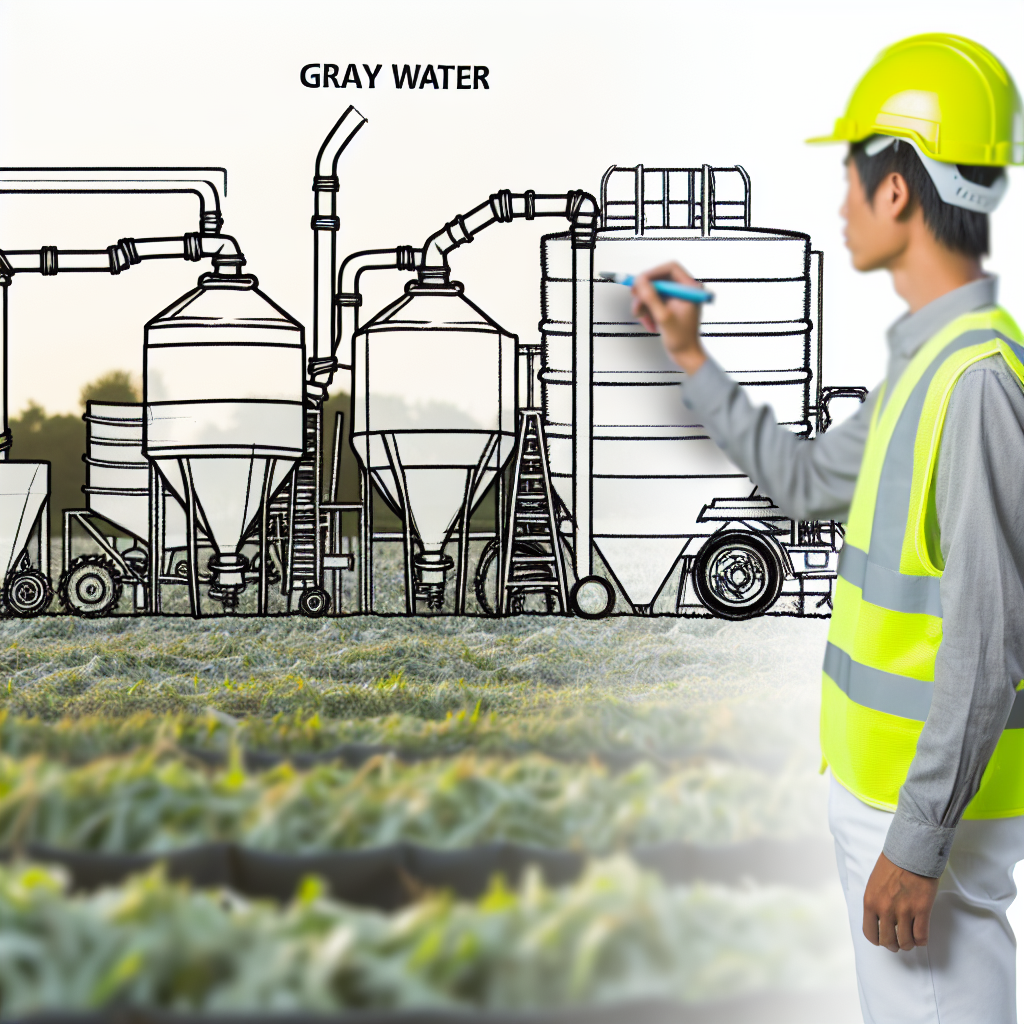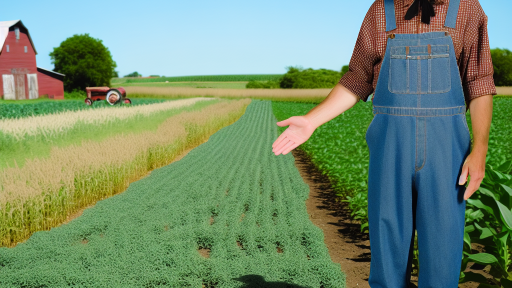Introduction to Gray Water Recycling and Its Importance in Agriculture
Gray water recycling offers significant benefits for agricultural practices.
This practice utilizes wastewater from domestic activities.
Common sources include sinks, showers, and washing machines.
Implementing gray water recycling promotes sustainable water use.
Water scarcity presents challenges for farmers worldwide.
By reusing gray water, agriculture can enhance water efficiency.
Furthermore, it reduces the strain on freshwater resources.
Many regions face increasing pressures from climate change.
Gray water recycling can be a reliable alternative water source.
In addition, it can support crop irrigation effectively.
By adopting these techniques, farmers can cut costs.
They also improve the overall health of the environment.
Effective management of gray water can enrich soil quality.
It introduces nutrients that promote plant growth.
Moreover, recycling this water helps maintain water cycles.
Transform Your Agribusiness
Unlock your farm's potential with expert advice tailored to your needs. Get actionable steps that drive real results.
Get StartedUltimately, gray water recycling empowers agricultural resilience.
It plays a vital role in sustainable development strategies.
The importance of this practice cannot be overstated.
Farmers should explore various techniques for effective implementation.
Types of Gray Water Sources Suitable for Agricultural Use
Residential Sources
Residential gray water originates from sinks, showers, and washing machines.
This type of water typically contains soap, dirt, and organic matter.
It is often suitable for irrigation of ornamental plants and lawns.
Proper treatment can make this water safe for crops.
Commercial Sources
Commercial establishments generate significant amounts of gray water.
Examples include restaurants, hotels, and laundromats.
This water contains food waste, grease, and detergents.
With appropriate filtration, it can support agricultural irrigation.
Industrial Sources
Some industries produce gray water that can be recycled.
This water often comes from processes like cooling or washing.
However, it may contain harmful chemicals, necessitating careful treatment.
Only well-regulated industrial gray water is suitable for agriculture.
Agricultural Sources
On-farm operations also generate gray water.
Examples include washwater from equipment and facilities.
This water often contains fertilizers or pesticides, so treatment is critical.
Recycling this water can improve sustainability in farming practices.
Educational Institutions
Schools and universities often utilize gray water in their facilities.
Sources include dishwashing and cleansing activities in cafeteria settings.
With proper treatment, this water can support campus gardens and landscapes.
Engaging students in this practice raises awareness of water conservation.
Showcase Your Farming Business
Publish your professional farming services profile on our blog for a one-time fee of $200 and reach a dedicated audience of farmers and agribusiness owners.
Publish Your ProfileBenefits of Gray Water Recycling for Irrigation and Soil Health
Enhancing Water Efficiency
Gray water recycling significantly improves water efficiency in agriculture.
Farmers use this technique to conserve precious water resources.
By reusing water, they can reduce dependency on freshwater supplies.
This approach addresses water scarcity issues faced by many regions.
Supporting Sustainable Agriculture
Utilizing gray water promotes sustainable agricultural practices.
It leads to reduced environmental impact from agricultural runoff.
Moreover, it minimizes the chemical load on freshwater systems.
Farmers adopting these techniques contribute to ecological balance.
Improving Soil Health
Gray water often contains beneficial nutrients for soil health.
These nutrients help enhance soil fertility and structure.
Organic matter from recycled water boosts microbial activity in the soil.
Healthy soil contributes to better crop yields and resilience.
Cost-Effectiveness
Implementing gray water recycling can reduce operational costs.
Farmers spend less on water procurement and treatment.
Long-term savings on irrigation can offset initial setup costs.
This financial benefit encourages more farmers to adopt sustainable practices.
Compliance with Regulations
Using gray water can help farmers meet environmental regulations.
Regulations often promote water conservation and responsible usage.
By recycling gray water, farmers align with these policies.
Thus, they support local conservation efforts as well.
You Might Also Like: Integrating Circular Economy in Farm Waste Management
Overview of State Regulations and Guidelines for Gray Water Usage in Agriculture
Gray water recycling is increasingly popular in agricultural practices.
However, regulations and guidelines vary significantly by state.
Each state establishes its own rules regarding gray water usage.
Understanding these regulations ensures compliance and safe practices.
General State Guidelines
Most states categorize gray water based on its source.
Common sources include sinks, showers, and laundry facilities.
States often specify acceptable uses for gray water in agriculture.
Specific guidelines can cover irrigation methods, application rates, and crops.
Permitting and Registration Requirements
Some states require permits for the use of gray water.
Farmers must apply for these permits before starting their operations.
Registration processes can differ, depending on local jurisdictions.
Compliance helps mitigate potential environmental risks.
Health and Safety Standards
Health regulations focus on preventing contamination and ensuring public safety.
Some states mandate water quality testing for gray water systems.
Testing helps certify that gray water meets safety standards.
Farmers may need to follow specific treatment protocols as well.
Educational Resources and Support
Many state agencies provide educational resources for farmers.
Workshops and informational materials help farmers understand regulations.
Local agricultural extensions often offer guidance on best practices.
Showcase Your Farming Business
Publish your professional farming services profile on our blog for a one-time fee of $200 and reach a dedicated audience of farmers and agribusiness owners.
Publish Your ProfileNetworking with other farmers can also provide practical insights.
Case Studies and Examples
Examining successful gray water programs can provide valuable lessons.
Several states have implemented innovative solutions that benefit agriculture.
These examples can shed light on effective gray water usage.
Farmers can adapt these models to fit their local conditions.
Gain More Insights: Soil Health Practices For Sustainable Farming
Technologies and Systems for Collecting and Treating Gray Water
Introduction to Gray Water Recycling
Gray water recycling plays a crucial role in sustainable agriculture.
This practice recycles water from sinks, showers, and washing machines.
Farmers can use this water for irrigation and crop production.
Collection Systems
Efficient collection systems are essential for gray water recycling.
One common method is the use of catchment basins.
These basins gather gray water from domestic sources.
Another method utilizes drains to channel water directly to holding tanks.
Pumps then distribute the collected water to crops.
Treatment Techniques
Treatment techniques ensure that gray water is safe for irrigation.
Filtration systems remove solids and contaminants effectively.
Activated carbon filters enhance water quality by adsorbing impurities.
Additionally, UV treatment systems kill harmful microorganisms.
Storage Solutions
Effective storage solutions are vital for gray water management.
Aeration tanks help keep water oxygenated and reduce odor.
Air-tight storage tanks prevent contamination and facilitate safe use.
Application Methods
Various application methods optimize gray water use in agriculture.
Drip irrigation systems deliver water directly to plant roots.
Sprinkler systems can distribute treated gray water across larger areas.
Both methods promote efficient water usage and plant health.
Regulatory Considerations
Understanding regulations is crucial for gray water systems.
Farmers must comply with local and state guidelines.
These regulations often dictate treatment standards and application methods.
Regular inspections can help ensure compliance and safety.
Innovations in Gray Water Technology
Recent innovations improve gray water recycling systems significantly.
Smart sensors can monitor water quality in real time.
Automated systems enhance efficiency and reduce human error.
Continuous research could lead to new treatment methods in the future.
Uncover the Details: Soil Regeneration Techniques For Modern Farms

Case Studies: Successful Implementation of Gray Water Recycling in Farms
Introduction to Gray Water Recycling
Gray water recycling offers significant benefits for agriculture.
It provides a sustainable water source for irrigation.
Moreover, it reduces pressure on freshwater supplies.
Case Study: Green Fields Farm
Green Fields Farm in California successfully adopted gray water recycling.
They implemented a simple filtration system for their irrigation needs.
As a result, water usage decreased by 30% within the first year.
Showcase Your Farming Business
Publish your professional farming services profile on our blog for a one-time fee of $200 and reach a dedicated audience of farmers and agribusiness owners.
Publish Your ProfileThis farm efficiently reused water from showers and sinks.
The crops flourished with the recycled water, showing no health issues.
Case Study: Sunny Acres Orchard
Sunny Acres Orchard located in Florida integrated gray water into their system.
They used advanced treatment processes to ensure water quality.
This orchard collects gray water from washing equipment and cleaning tools.
Consequently, their fruit production increased by 15% annually.
Farmers reported improved soil moisture retention as well.
Case Study: Mountain View Dairy
Mountain View Dairy in Colorado implemented a more complex system.
They installed a multi-stage filtration and disinfection setup.
This system efficiently treated gray water from their milking operations.
The dairy reduced its water bill significantly by 40%.
Additionally, they minimized wastewater discharge into local streams.
Challenges Faced During Implementation
Despite the benefits, farms faced challenges during implementation.
Initial costs were a significant barrier for many farmers.
Moreover, regulations surrounding gray water use varied by region.
Farmers needed to ensure compliance with health standards.
Technical knowledge about treatment systems also presented obstacles.
The Future of Gray Water Recycling in Agriculture
Looking ahead, gray water recycling appears promising for farmers.
Innovations in filtration technology will enhance system efficiency.
Furthermore, public awareness about sustainability is growing.
Supportive policies can encourage more farmers to adopt these practices.
Ultimately, gray water recycling may play a crucial role in sustainable agriculture.
Learn More: Organic Farming Infrastructure Tips For Sustainable Growth
Challenges and Limitations of Gray Water Recycling in Agricultural Settings
Health and Safety Concerns
Gray water can contain harmful pathogens and bacteria.
These microorganisms pose potential health risks to crops and consumers.
Thus, proper treatment and disinfection are essential.
Farmers must monitor water quality regularly.
Inadequate testing can lead to unsafe agricultural practices.
Regulatory and Legal Issues
Regulations regarding gray water use vary by region.
Some areas have strict rules limiting its application.
Farmers often face challenges in navigating these regulations.
Legal restrictions can hinder effective recycling initiatives.
Moreover, compliance can increase operational costs.
Technical Limitations and Costs
Implementing gray water recycling systems can be expensive.
Initial setup costs for treatment facilities can be high.
Maintenance of these systems requires continuous investment.
Additionally, not all gray water systems are designed for agricultural use.
Farmers might need specialized equipment to handle this water.
Public Perception and Acceptance
Public attitudes towards gray water use in agriculture can be negative.
Many consumers associate gray water with contamination risk.
Showcase Your Farming Business
Publish your professional farming services profile on our blog for a one-time fee of $200 and reach a dedicated audience of farmers and agribusiness owners.
Publish Your ProfileThis perception can affect marketability of agricultural products.
Education about the safety and benefits of gray water is vital.
Farmers must build trust with consumers regarding water usage.
Environmental Concerns
Improper gray water recycling can lead to soil and water contamination.
Chemicals from household products may harm the environment.
Consequently, farmers need to select suitable gray water sources.
Long-term environmental impacts require careful assessment.
Moreover, sustainability must remain a priority for farmers.
Future Trends in Gray Water Recycling Technologies and Practices
Integration of Smart Technologies
Smart technologies will enhance gray water recycling systems.
These technologies include IoT sensors and automated management systems.
They allow real-time monitoring of water quality and usage.
With these advancements, farmers can optimize their irrigation practices.
This ensures efficient water use and reduces waste.
Advanced Filtration Techniques
Filtration innovations will improve gray water treatment processes.
Membrane bioreactors and UV disinfection are promising methods.
These techniques provide higher purification levels.
Consequently, they expand the potential uses of gray water in agriculture.
Farmers will have greater access to safe and sustainable irrigation solutions.
Government Policies and Incentives
Government initiatives will play a critical role in gray water recycling.
Subsidies for technology adoption can encourage farmers to invest.
Additionally, educational programs will raise awareness about gray water benefits.
Public policies will create a supportive environment for sustainable practices.
Furthermore, collaboration among stakeholders will enhance these efforts.
Public Awareness and Community Engagement
Public awareness campaigns will drive the adoption of gray water recycling.
Communities will benefit from understanding the importance of water conservation.
Workshops and demonstrations can showcase successful projects.
This engagement fosters a culture of sustainability.
As a result, more farmers will embrace innovative practices.
Research and Development Initiatives
Ongoing research will focus on improving gray water technologies.
Universities and agricultural institutions will lead these initiatives.
Collaborations among industries will enhance innovation.
New solutions will address specific agricultural needs and challenges.
As a result, farmers will have access to cutting-edge practices.
Additional Resources
What is Sustainable Agriculture? | Union of Concerned Scientists
Water Conservation in Agriculture – Nevada Irrigation District




